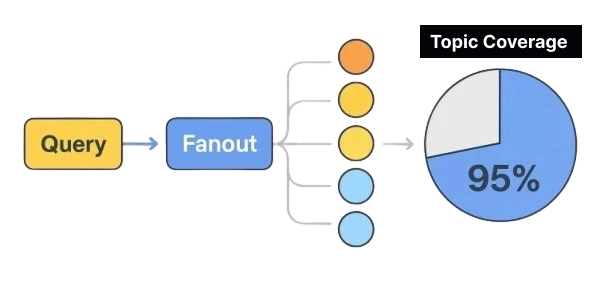In traditional SEO, we optimize for keywords.
In AI SEO, we optimize for concepts and intent layers.
That’s why at LLMClicks, we use multi-layer fanout query generation — expanding 10–20 GSC keywords into 150–240 semantically rich, AI-ready prompts — covering 95% of the topic ecosystem.
But generating queries is only half the story.
The real win comes when you turn those queries into structured, AI-optimized content.
Here’s exactly how 👇

Start with your real search data from Google Search Console.
Filter top queries by clicks, impressions, and position (≤50).
Cluster semantically and classify by intent (Informational, How-to, Transactional, Comparison, Local).
Use LLMClicks’ Multi-Layer Fanout Engine to expand each cluster into:
Core queries (main topic)
Adjacent topics
Problem–solution queries
Related ecosystem concepts
🎯 Output: 150–240 high-quality LLM-style queries per topic
→ This is your topic universe — what AI and humans are really asking about your niche.
That’s the new challenge facing insurers in the age of AI-first discovery.
Next, LLMClicks automatically groups queries into content templates based on semantic proximity and intent type.
For example:
| Query Layer | Content Format Blueprint | Goal |
|---|---|---|
| Informational | Blog post / Knowledge Hub | Awareness & topical authority |
| How-to | Step-by-step Guide / Checklist | Search intent depth |
| Transactional | Comparison / Product Page | Conversion-focused |
| Problem–Solution | Troubleshooting / Use Case | High user engagement |
| Adjacent Topics | Cluster article / Internal link target | Semantic reinforcement |
🎯 Output: Structured content map with recommended content types for each intent layer.
Now comes the AI part.
Each query cluster becomes a content prompt input for your LLM or internal content agent.
Example prompt in LLMClicks Agent:
“Write a detailed article addressing the following related user queries:
How to fix duplicate business citations
Why are my business citations inconsistent
How to clean up local listings
Focus on clarity, include stats, and cite authoritative sources.”
💡 The agent uses your fanout query clusters as topic scaffolds, ensuring that every angle of the topic is covered.
🎯 Result: Each article covers multiple semantic layers → feeding back into the 95% topic coverage metric.
Every piece of content generated is then:
Mapped to its fanout query cluster (Query → Page mapping)
Checked with our On-Page AI Audit (meta, headings, schema, entity density, etc.)
Scored for Semantic Coverage % — how well it covers its cluster queries
If a page covers <70% of its cluster queries, the system recommends:
Adding missing sections
Integrating FAQs
Expanding internal links to related concepts
🎯 Goal: Every page becomes an LLM-friendly, multi-intent hub — not just an article.
Once pages go live:
LLMClicks tracks citations and mentions across ChatGPT, Perplexity, Claude, etc.
Shows AI Visibility Gains per Query Cluster
Identifies new “cold” queries (topics where you’re not cited yet)
→ Feed those cold queries back into the Fanout Engine
→ Generate new supporting content
This creates a closed-loop, self-optimizing system — from queries → content → AI visibility → new queries.
| Stage | What Happens | Outcome |
|---|---|---|
| 1️⃣ Generate Queries | Multi-layer fanout (core + adjacent + problem + related) | 150–240 high-quality prompts ” |
| 2️⃣ Cluster Intelligently | Intent + semantic grouping | Clear content structure |
| 3️⃣ Generate Content | Feed clusters to AI/agents | AI-optimized pages |
| 4️⃣ Audit & Map | On-page + Query-to-Page | Quality & coverage control |
| 5️⃣ Measure & Evolve | Track citations & re-optimize | 95%+ topic coverage over time |
Fanout Queries aren’t just for keyword expansion — they’re for topic domination.
By pairing multi-layer fanout generation with content clustering and AI optimization, you can build an interconnected content ecosystem that LLMs recognize as authoritative.
That’s how LLMClicks helps brands move from keyword visibility → AI visibility.
© LLMClicks.ai All Right Reserved 2026.